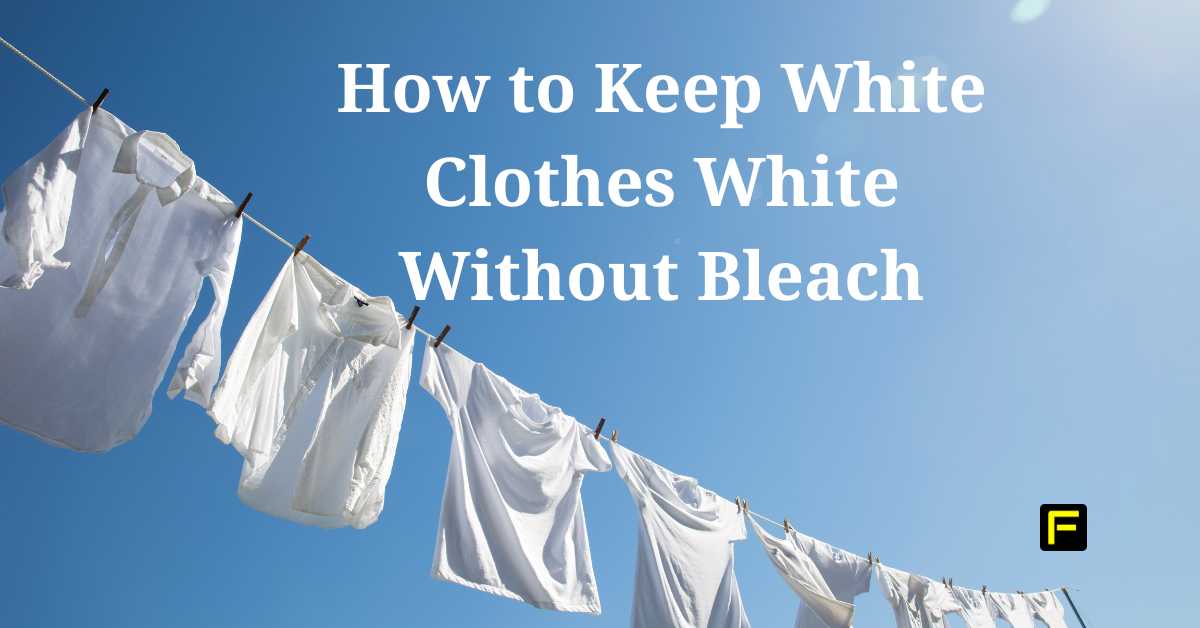Keeping your clothes clean and bright can be a challenge. Especially when it comes to white garments, they can easily lose their brightness.
In this guide, we’ll explore how to keep white clothes white without bleach.
This method is great for those who prefer not to use harsh chemicals.
You’ll learn simple and effective ways to maintain the color of your white clothes.
Using natural whiteners is important for keeping white clothes looking good.
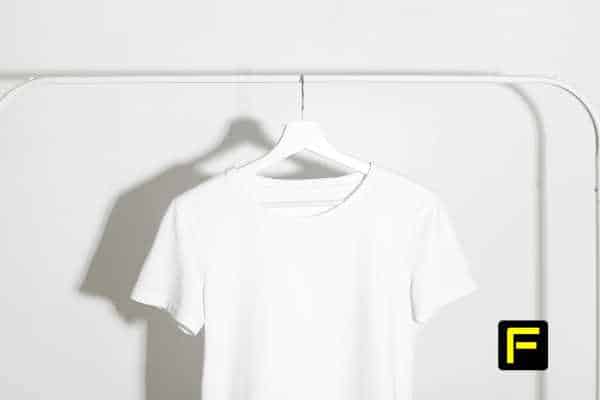
Knowing the right way to wash and care for fabric helps a lot too.
It’s key to treat stains fast and use smart ways to keep whites bright.
This helps your white clothes last longer and look better.
These methods are good for the environment and gentle on the fabric.
Key Takeaways
- White clothes can remain bright without the use of harsh chlorine bleach.
- Using natural agents and understanding fabric care contribute to the longevity of white garments.
- Proper washing techniques and stain handling are crucial for maintaining white clothes.
Understanding Fabric Care
Keeping white clothes white without the use of bleach requires particular attention to the laundry products chosen and a clear understanding of fabric care instructions.
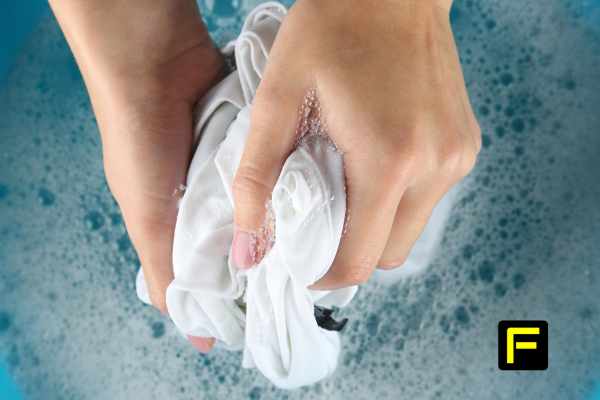
By prioritizing these elements, you can maintain the brightness of their clothing effectively.
Choosing the Right Laundry Products
When selecting laundry products to whiten laundry, one should look for quality laundry detergents that offer a brightening effect without harsh chemicals.
Some detergents are specifically formulated to tackle dullness and bring out the whiteness in fabrics.
Fabric softeners can play a significant role in maintaining the softness and vibrancy of white clothing.
You should use fabric softeners sparingly. They will build up on fabrics and reduce their ability to stay bright and clean.
Reading Fabric Care Instructions
Each item of clothing typically comes with a label outlining specific fabric care instructions.
It is crucial to read and follow these guidelines to prevent damaging the clothing.
The label will often suggest the best water temperature for washing and whether a gentle cycle is required.
Following these instructions not only helps keep white clothes looking fresh but also extends the life of the fabric.
Not following these tips can cause problems that may cause color change or damage to your clothing.
Natural Whitening Agents
In seeking eco-friendly alternatives to bleach for laundry, one can turn to natural ingredients like baking soda, hydrogen peroxide, lemon juice, and white vinegar.
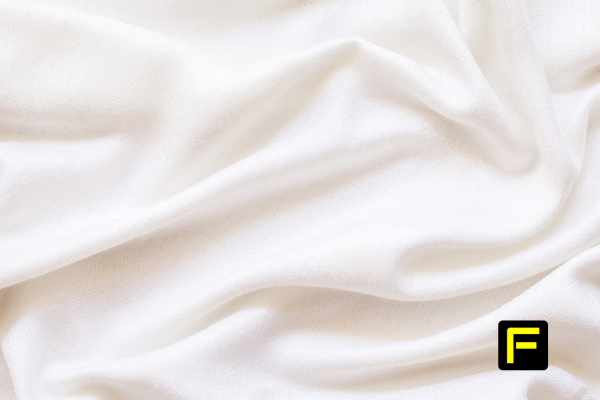
These agents are not only safe to use but also gentle on fabrics and effective in achieving brighter whites.
Baking Soda Uses
Baking soda is a multi-purpose cleaner that naturally whitens clothes.
When adding 1/2 cup of baking soda to laundry, it not only brightens whites but also softens fabrics.
For targeted stains, a paste of baking soda and water can be applied directly to the stain before washing.
The Power of Hydrogen Peroxide
Hydrogen peroxide acts as a mild bleach and can be used to whiten clothes without harsh chemicals.
A cup of hydrogen peroxide added to the wash helps whiten fabrics. It’s safe for use on most clothing and can also assist in removing stains when pre-treating garments.
Lemon Juice for Brightening
Lemon juice is a natural bleaching agent due to its citric acid content.
To brighten whites, add 1/4 to 1/2 cup of lemon juice to the rinse cycle. For a sun-kissed effect, drying the clothes in direct sunshine after washing them with lemon juice can further enhance the whitening power.
White Vinegar Solutions
White vinegar serves as a natural fabric softener and a whitening agent.
Mix one part vinegar with four parts water and soak clothes to pre-treat them before washing.
Alternatively, simply add 1 cup of white vinegar during the wash cycle. This will remove yellowing and leave clothes feeling clean and refreshed.
Effective Washing Techniques
Keeping white clothes white without bleach is entirely possible with the right washing techniques.
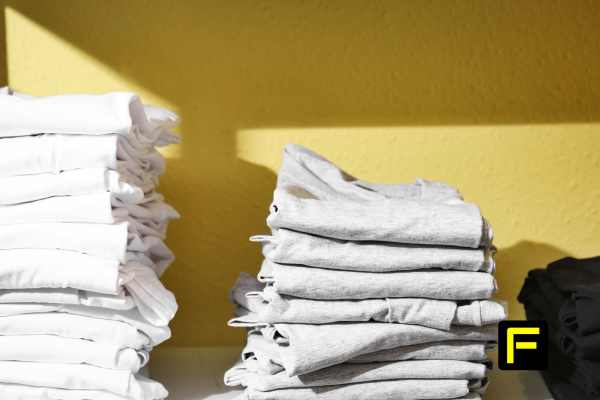
By properly sorting and pre-treating stains, optimizing the wash cycle, and selecting the appropriate water temperature, you can maintain the brightness of their whites efficiently.
Proper Sorting and Pre-treatment
Always sort clothing by color, separating whites from colored garments to prevent color transfer.
For any visible stains on white clothes, a pre-treatment using a bleach alternative like distilled white vinegar or baking soda can be effective.
Applying a mixture directly to the stain and allowing it to soak before washing can help lift the stain away.
Optimizing the Wash Cycle
During the wash cycle, it’s advisable to add a bleach alternative to the detergent.
Include a half cup of baking soda to enhance the cleaning power, which not only helps in keeping whites bright but also assists in eliminating residue from previous detergents.
The Right Water Temperature
While some garments require cold water to prevent shrinkage or damage, warm water can be more effective in dealing with stubborn stains and dinginess.
A hot water soak or rinse, as suggested by Martha Stewart, can brighten whites without the need for harsh chemicals.
Always check garment labels to avoid using a temperature that could cause damage.
Handling Tough Stains
When dealing with tough stains on white clothes, don’t always resort to bleach.
Several effective alternatives can help restore whites without the use of harsh chemicals.
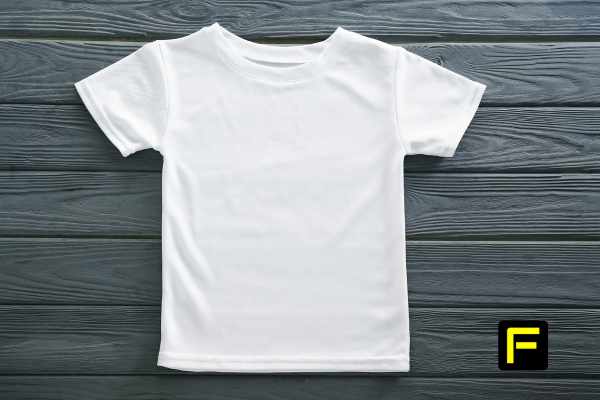
Stain Remover Options
For stubborn stains, commercially available non-toxic stain removers are an excellent option.
They are specifically formulated to tackle different types of stains while being gentle on fabrics and safe for the environment.
Brands such as Charlie’s Soap offer natural laundry liquids that effectively remove stains without the need for bleach.
When selecting a stain remover, one might also consider options that are free of fragrances and dyes, which are gentle on sensitive skin.
- Eco-Friendly Alternatives: There are products on the market that boast eco-friendly credentials, utilizing enzymes and other natural compounds to break down stains.
- Dishwasher Detergent: A less conventional but effective method involves using a small amount of eco-friendly dishwasher detergent as a pre-soak, which can help in lifting food-related stains.
Homemade Stain Removal Solutions
For those who prefer homemade solutions, various household items can be repurposed as stain fighters for white clothes:
- Hydrogen Peroxide: As an alternative to bleach, hydrogen peroxide can be used. A cup of 3% hydrogen peroxide added to the bleach dispenser or directly on the stain can do wonders, as suggested by Branch Basics.
- Aspirin: Crushing aspirin into a powder and mixing it with water to create a paste can help in removing sweat stains. Apply it directly onto the stain and let it sit before washing.
While managing white clothing, remember to treat stains as quickly as possible for the best chance of removal.
With these options and solutions, it’s feasible to keep clothes white, fresh, and stain-free, using safer and more environmentally responsible methods.
Maintaining White Clothes
Maintaining the brightness of white clothes can be achieved through proper care and some clever laundry techniques.

Here are specific steps one can integrate into their laundry routine to keep whites pristine without resorting to bleach.
Routine Care Tips
Whites should be laundered separately to prevent colors from bleeding onto them.
Use a detergent designed for whites and consider adding a chlorine-free bleach alternative such as oxygen-based bleaches.
These oxides are effective at maintaining brightness while being less harsh on fabrics than traditional bleach.
- Sun-Drying: Sunlight naturally whitens clothing; therefore, drying whites in the sun can help maintain their brightness.
- Bluing Agent: Adding a few drops of bluing liquid to the rinse cycle can counteract yellowing.
- Temperature Settings: Wash whites in the hottest water safe for the fabric to more effectively remove dirt.
Avoiding Yellowing and Dinginess
Prevention of yellowing and dinginess is key in extending the life and appearance of white garments.
- Immediate Treatment of Stains: Promptly treating stains before they set can prevent discoloration.
- Measuring Laundry Products: Overuse of detergent or fabric softener can lead to build-up that may contribute to dinginess; measure them according to the product instructions.
- Regular Washing: Frequent laundering prevents the accumulation of body oils and sweat, which can lead to yellowing over time.
By using these methods, you can whiten white clothes without the need for harsh bleach, prolonging their life and ensuring they stay as vibrant as the day they were purchased.
Frequently Asked Questions
Navigating the world of laundry care can sometimes be as delicate as the fabrics you’re washing. Here are some methods and household remedies that can help keep your white clothes bright without resorting to bleach.
What are some natural methods to maintain the brightness of white clothes?
Maintain the brightness of white clothes using natural substances like lemon juice and sunlight. Soaking garments in a mixture of hot water and lemon juice before drying them in the sun can be effective for whitening.
Can baking soda be used to whiten clothes, and if so, how?
Yes, baking soda can be used to whiten clothes. Adding half a cup of baking soda to the laundry can help brighten and soften the fabrics.
What steps can be taken to whiten yellowed white clothes effectively?
To combat yellowing, one can create a soak solution with warm water and oxygen-based bleach. Submerging the yellowed garments for a few hours before a regular wash can significantly restore their whiteness.
Is there a laundry whitener that can replace traditional bleach for white clothes?
Hydrogen peroxide acts as an effective laundry whitener and can replace traditional bleach. Adding it to the wash along with regular detergent can help in keeping whites looking bright.
How can vinegar be used in laundry to help whiten clothes?
Vinegar is beneficial in laundry for both its whitening and softening properties. Adding half a cup of distilled white vinegar during the rinse cycle can help remove detergent residue and brighten clothes.
What is the best way to restore whites after a color run in the wash?
The best way to restore whites after a color run is to immediately rewash the affected clothes in cold water with non-chlorine bleach and detergent, which can often reverse the damage caused by color bleeding.

Rick Huey is a fitness writer who has dedicated his life to living an active lifestyle. With more than 30 years of experience in the fitness industry, Rick is a respected contributor for FitFab50.com, where he shares his wealth of knowledge with a wide audience. His dedication to promoting the benefits of living an active lifestyle has inspired many people to pursue their own fitness journeys with enthusiasm and dedication.
